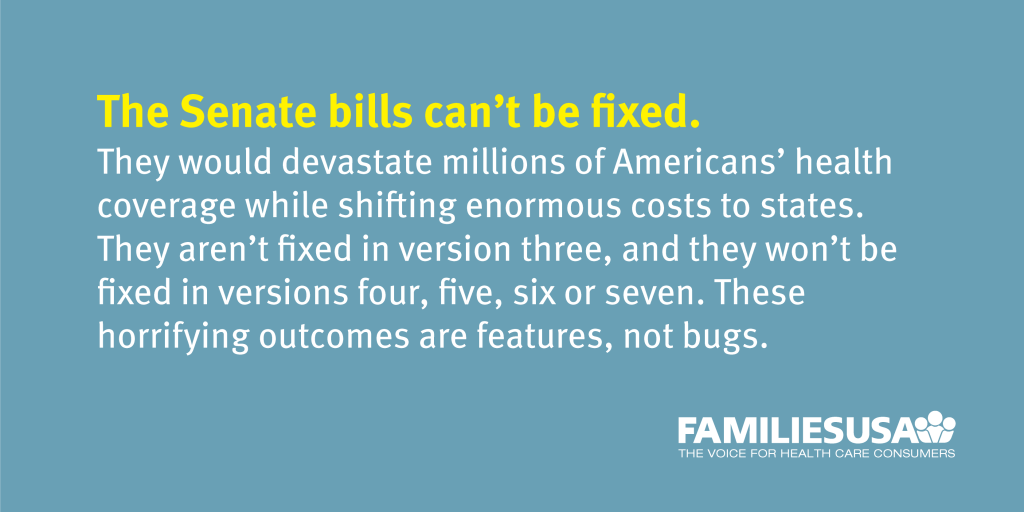
CBO Reveals No Tweaks Can Fix the Senate Health Care Bill
07.20.2017
On July 20, CBO scored the Senate’s third version of the Better Care Reconciliation Act (BCRA). The third time is not a charm. This iteration of the Senate bill would still gut the core Medicaid program, end the Medicaid expansion, dramatically increase deductibles and out-of-pocket costs, and take away health insurance from 22 million people.
The Senate bill still creates new tax breaks that mostly benefit the wealthy and large corporations. This bill would devastate millions of Americans’ health coverage and care while shifting enormous costs to states. These things can’t be fixed. They aren’t fixed in version three, and they won’t be fixed in versions four, five, six or seven. These horrifying outcomes are features, not bugs.

The bill’s basic features remain terrible
Higher deductibles: CBO confirms that the newest version of the Senate bill would force people into coverage with $13,000 deductibles. The bill eliminates financial assistance to lower deductibles and other cost-sharing and cuts tax credits that help pay premiums. The plans purchased by these shrunken tax credits—skimpier than any plan allowed under the ACA—would come with a staggering $13,000 individual deductible in 2026.
Someone making $26,500 faces a deductible around $800 today, according to CBO. Under the Senate bill, their deductible would increase more than 16 fold. Instead of a deductible consuming only 3 percent of income, they would face a deductible requiring them to spend almost half of their total income on health care before insurance begins providing coverage. CBO predicts that many low-income people would simply not purchase coverage.
Higher premiums for older adults: The Senate bill would drastically increase premiums for older adults. A 64-year-old making just over $55,000 a year would see premiums skyrocket from $6,750 to $18,250 to keep the same level of coverage they have today. Even if they moved to the skimpiest available plan, they would still pay $7,250 more in premiums, on top of facing an enormous increase in deductibles.
Huge Medicaid cuts: Medicaid cuts continue to be unconscionably cruel: cutting funding by over 25 percent in 10 years; likely rising to 35 percent 10 years thereafter; and ending Medicaid expansion coverage for more than 10 million people.
Health Savings Accounts (HSAs) and Cruz Amendment make a bad bill worse
Although these grim basic results remain fundamentally the same as previous versions of the bill, critical new details are deeply problematic.
HSAs could reduce employer coverage: The new version of the bill permits the use of Health Savings Accounts (HSAs) to pay individual-market premiums. If corporate executives and highly-paid staff can use tax-sheltered HSAs to buy their own insurance, some companies will drop ESI, disrupting coverage for workers at all income levels. Notably, the CBO projects that 2 million Americans would lose employer-sponsored insurance (ESI) once the new bill is fully implemented.
The Cruz Amendment: Senate leadership cynically withheld the Cruz Amendment from CBO consideration, but we know its effects: The Cruz Amendment would divide the individual insurance market into (1) ACA-compliant plans that provide consumer protections; and (2) largely unregulated insurance. Along with the insurance industry and the actuarial profession, we have argued that this amendment would cause a death spiral, with skyrocketing premiums and the eventual disappearance of health insurance that meets the needs of people with health problems.
The Trump Administration just contracted for and released implausible estimates of the Cruz amendment’s effects–finding, for example, that as many as 8.6 million people will buy unregulated insurance with $12,000 individual deductibles. The contractor—presumably at the direction of the Trump Administration—reached these findings based on wildly unrealistic assumptions–that plan design is the same for all individual coverage, even though the Cruz Amendment lets unregulated plans cover substantially less than ACA-compliant plans; and that every geographic area includes “an adequate number of insurers” offering comprehensive coverage. The report thus flatly assumes into nonexistence the Cruz Amendment’s central danger flagged by the insurance industry – namely, a death spiral that makes comprehensive coverage unavailable for the consumers who need it.
As the CBO score makes clear, this bill –just like all other iterations – would devastate health coverage and care for millions of American families. The Senate bill would mean less access, fewer choices, and higher costs for consumers – if they’re able to get coverage at all.
No tweak can fix this bill. It’s time for the Senate to reject this basic approach, instead working together on practical, bipartisan solutions that build on the ACA’s strengths to improve the quality and affordability of health coverage for all of our nation’s families.




